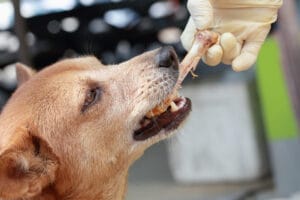Kennel cough, also known as canine infectious tracheobronchitis, is a highly contagious respiratory infection that commonly affects dogs. Learn all about kennel cough symptoms, treatment options, and even prevention. As a responsible dog owner, it’s important to be aware of common dog health issues so we’ve got you covered!
What is kennel cough?
Kennel cough is a respiratory infection that affects a dog’s trachea and bronchi, causing inflammation and irritation. It is most commonly caused by a combination of viruses and bacteria, such as the canine parainfluenza virus, canine adenovirus, and Bordetella bronchiseptica bacteria. The infection spreads through airborne droplets, direct contact with infected dogs, or contaminated surfaces. Places with a high concentration of dogs, such as kennels, dog parks, and shelters, are particularly susceptible to outbreaks.
What are kennel cough symptoms?
The most common symptom of kennel cough is a persistent, dry, hacking cough that may sound like honking. Other symptoms may include sneezing, nasal discharge, lethargy, loss of appetite, and occasionally a mild fever. While kennel cough isn’t life-threatening, it can be particularly severe in young puppies, senior dogs, or those with weakened immune systems. If you notice symptoms in your dog, consult a veterinarian for a proper diagnosis.
How do you treat it?
In most cases, the cough resolves independently within a few weeks without specific treatment. However, your veterinarian may recommend certain medicine to alleviate discomfort and aid in a speedy recovery. These may include cough suppressants, antibiotics to address bacterial infections, and, in severe cases, anti-inflammatory medications. Follow your veterinarian’s advice and complete the prescribed course of medication to ensure the infection is fully eradicated.
Prevention
Prevention plays a vital role in managing the cough and reducing its spread. Here are some preventive measures you can take:
- Vaccination. Ensure your dog receives regular vaccinations. The Bordetella vaccine specifically targets kennel cough. Discuss the appropriate vaccination schedule for your dog with your vet.
- Avoid high-risk environments. For example, limit your dog’s exposure to crowded places, especially during outbreaks. If your dog needs to be boarded or stay in a kennel, choose a reputable facility with strict hygiene practices and proper ventilation.
- Good hygiene practices at home. Regularly clean and disinfect your dog’s belongings, such as bedding, toys, and food bowls. Additionally, wash your hands thoroughly after contacting other dogs, especially if they show signs of respiratory illness.
- Isolate infected dogs. If your dog is diagnosed with kennel cough, isolation is key. Separation from other dogs prevents the spread of the infection.
When should you seek veterinary care?
While most cases of kennel cough resolve without complications, sometimes veterinary care is necessary. Reach out to your vet if your dog shows severe symptoms. For example difficulty breathing, persistent coughing fits, loss of appetite, or if conditions worsen despite home care. Timely intervention helps prevent complications and ensures a quick recovery.

Stay Informed
Understanding kennel cough means you can protect your dog’s health and prevent the spread of the contagious respiratory infection. By recognizing the symptoms, seeking veterinary care when needed, and practicing preventive measures, you and your dog will be prepared. Remember, a healthy and happy dog starts with a knowledgeable and proactive owner.




















